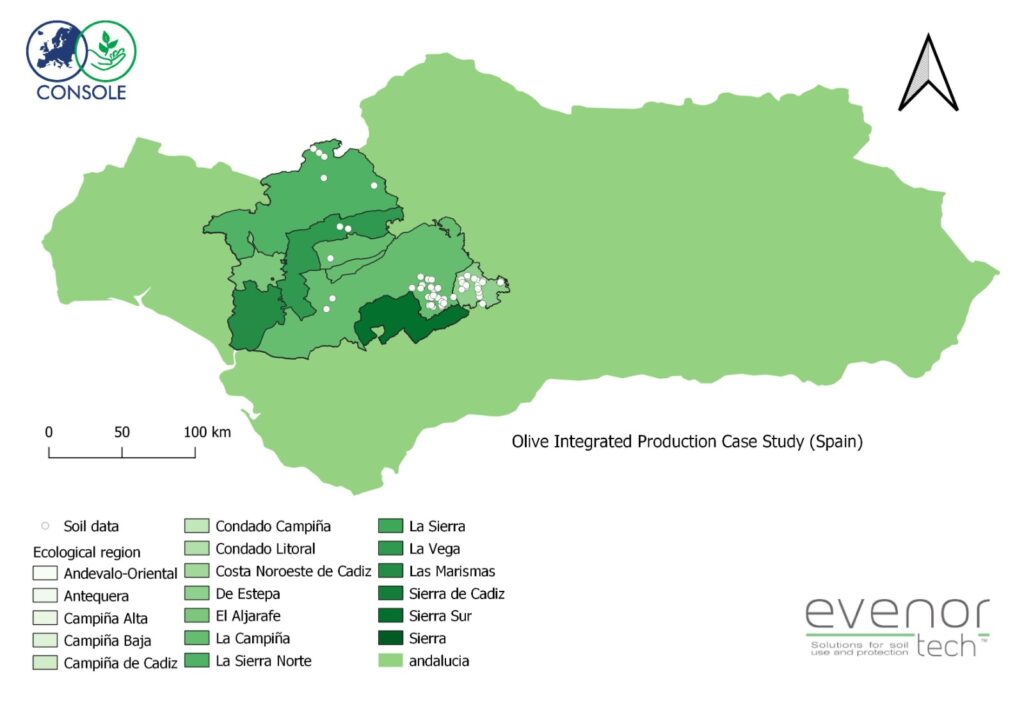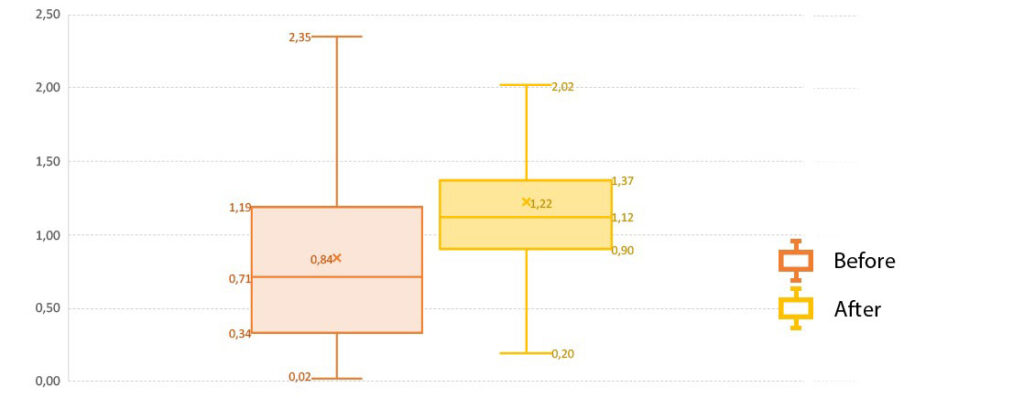The olive grove is one of the most important crops in Europe, representing almost 70% of the total world production and the main exporter of non-producing areas, such as North America.
In Spain, the olive tree (Olea europaea L.), occupies 2.5 million hectares and represents one of the three traditional historical crops of the country, together with the vine and the cereals (Mediterranean trilogy). However, its survival is in danger because the predictions of climate change models – with an increase in temperatures and a decrease in rainfall – will cause adverse effects on the olive grove in Andalusia, as could be the reduction of the harvests (Lorite, IJ. et al., year?).
<< The occupation of the surface by 91% in the provinces of Jaén and Córdoba >>
Faced with this situation, the policies of the European Union, through the Environmental Action Programs (Decision No 1386/2013 / EU) as a framework for the formulation of environmental policies in the EU, has bet on a sustainable growth of the primary sector.
<< Currently the 8th Environmental Action Program is in force >>
And to achieve these sustainability goals, contractual relationships have proven to be efficient instruments to promote the sustainable management of crops and Agri-Environmental Public Goods (Bartolini et al., 2005; Deliverable 1.3).
Under the project CONSOLE, the increase in soil carbon sequestration has been analysed within the framework of the Integrated Production System in the Andalusia region as part of the Green Deal and the new objectives of the CAP (REGULATION (EU) 2018/841; Fática and Panzica, 2020).
Integrated production is an agricultural system of plant production that uses agricultural techniques that ensure sustainable agriculture, using integrated pest management methods compatible with the protection of the environment, agricultural productivity and the use of mechanisms and natural production resources (Baroja Hernández, 2003). For this, the first step was the compilation, harmonization and standardization of different data sources (public and private sector).
Soil organic carbon changes were analysed by interpolating soil organic carbon data available before the establishment of Integrated Production (1992-95 vs 2017-2020) in 55 commercial plots. In addition, the efficiency and precision of Copernicus were analysed to monitor changes in soil organic carbon.

This analysis includes the application of 16 indices to compare with soil samples (in situ and ex situ data). The soil, the sites and the crop management variables were included in the study to respond to the diversity of the olive grove and facilitate the scale of results (tillage, planting patterns, pH, texture, slope, K, N, P, Ca , etc.).The results showed the increase in COS due to the implementation of Integrated Production in terms of crop and soil management.

The results and methodologies applied in this study will allow and facilitate the implementation of contractual relationships based on results focused on increasing the sequestration of soil organic carbon and, consequently, the mitigation of climate change.
References
- Baroja Hernández, E. (2003). Producción Integrada. Cuaderno de Campo. Consejería de Agricultura de Desarrollo Económico. Gobierno de La Rioja. Link
- Bartolini, F., Gallenrani, V., Raggi, M., Viaggi, D. (2005). Contract desing and targeting for the production of public goods in agriculture: the impact of the 2003 CAP reform. XI th congress of the EAAE. Link
- Deliah, H.A. (2000) The 1992 CAP reforms: a general analisys of its effect on the environment. Institu for Systems, Imformatics and Safety. Joint Research Center. European Commision. Link
- Fática, S., Panzica, R. (2020). Green bonds and too agrainst climate change? JRC Working Papers in Economics and Finance, 2020/10. European Commision. Link
- Lorite IJ, Gabaldón-Leal C, Santos C, Cruz-Blanco M, León L, Porras R, Belaj A, de la Rosa R. (año?). Impacto del cambio climático sobre la agricultura andaluza: Olivar. Instituto de Investigación y Formación Agraria y Pesquera. Consejería de Agricultura, Pesca y Desarrollo Rural. Junta de Andalucía. Link
- Pleguezuelo, C.R.R., Zuazo, V.H.D., Martínez, J.R.F. et al. Organic olive farming in Andalusia, Spain. A review. Agron. Sustain. Dev. 38, 20 (2018). https://doi.org/10.1007/s13593-018-0498-2. Link

Pingback: Dia Internacional de la Conservación del Suelo – evenor-tech
Pingback: El Carbono en el suelo y políticas para su promoción – evenor-tech
Pingback: Un éxito en la jornada de presentación de resultados del proyecto europeo CONSOLE organizado en las instalaciones de IFAPA Centro Las Torres-Tomejil – evenor-tech
Pingback: El secuestro de carbono en el suelo. Una herramienta clave para la mitigación del cambio climático – evenor-tech